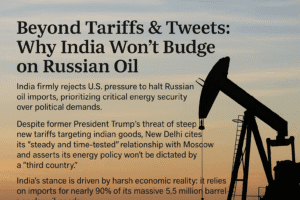Beyond Tariffs & Tweets: Why India Won’t Budge on Russian Oil
India firmly rejects U.S. pressure to halt Russian oil imports, prioritizing critical energy security over political demands. Despite former President Trump’s threat of steep new tariffs targeting Indian goods, New Delhi cites its “steady and time-tested” relationship with Moscow and asserts its energy policy won’t be dictated by a “third country.” India’s stance is driven by harsh economic reality: it relies on imports for nearly 90% of its massive 5.5 million barrel-per-day oil needs.
The country dramatically increased Russian crude purchases – from just 68,000 barrels daily pre-Ukraine invasion to a peak of 2.15 million – because of deep discounts unavailable elsewhere. This shift made Russia India’s top supplier, meeting almost 40% of demand at its height. Trump’s tariff gambit aims to pressure Russia via India but risks alienating a key democratic ally essential for U.S. Indo-Pacific strategy against China.
Ultimately, the standoff reveals how fundamental energy security forces even major democracies into pragmatic choices that challenge Western alliances, exposing the real-world limits of sanctions in a fractured global order. India’s calculation underscores that affordable energy for its 1.4 billion people remains non-negotiable, regardless of geopolitical friction.

Beyond Tariffs & Tweets: Why India Won’t Budge on Russian Oil
The geopolitical chessboard just witnessed a sharp move. Despite a direct economic threat from former (and potentially future) US President Donald Trump, India has firmly signaled its intent to keep buying Russian oil. This isn’t just a headline; it’s a stark lesson in cold, hard energy economics and the enduring complexities of global alliances.
The Core of India’s Stance:
- “Steady and Time-Tested”: India’s Foreign Ministry didn’t mince words. Its relationship with Russia is foundational, built over decades, and transcends the current crisis in Ukraine or US pressure. They explicitly stated it “should not be seen through the prism of a third country” – a clear rebuke to Washington’s attempts to dictate New Delhi’s energy partners.
- Energy Security is Paramount: Spokesperson Randhir Jaiswal laid out the raw calculus: India’s policy is dictated by “the availability of oil in the markets and prevailing global circumstances.” With nearly 88% of its massive 5.5 million barrel daily oil consumption met through imports, securing affordable, reliable flows isn’t a preference; it’s an existential necessity for its economy and 1.4 billion people.
- The Discount Dictates: The data speaks volumes. Pre-Ukraine invasion (Jan 2022), India bought a modest 68,000 barrels per day (bpd) from Russia. By June 2022, this skyrocketed to 1.12 million bpd, peaking at 2.15 million bpd in May 2023. Why? Deeply discounted Russian crude, shunned by Western buyers, became an irresistible economic lifeline. At its height, Russian oil constituted nearly 40% of India’s imports, dethroning traditional Middle Eastern suppliers.
Trump’s Tariff Gambit – Pressure with Uncertain Leverage:
Trump’s response – threatening a blanket 25% tariff plus an additional import tax on Indian goods – is a blunt instrument aimed squarely at punishing India for its Russian oil purchases. His stated rationale links it to Russia’s perceived intransigence on a Ukraine ceasefire, framing the tariffs as a tool to pressure Moscow indirectly by squeezing its key customer.
The High-Stakes Calculations:
- India’s Risk: The US remains a critical trade partner and strategic counterweight to China. New tariffs could hurt Indian exporters significantly. However, the immediate cost of replacing millions of discounted Russian barrels daily – likely at far higher market prices – could inflict even deeper economic pain. India is betting its energy security outweighs the tariff threat, or that the threat may not fully materialize or be negotiable.
- The US’s Dilemma: Punishing a major democratic partner like India, crucial to its Indo-Pacific strategy against China, carries substantial geopolitical risk. Can the US afford to alienate India over energy purchases driven by stark economic reality? The effectiveness of tariffs in coercing either India or Russia is highly questionable.
- Russia’s Gain: Continued Indian purchases provide a vital economic lifeline, helping sustain its war effort despite Western sanctions. It demonstrates Russia’s ability to pivot its energy exports to “friendly” nations.
The Human Insight: Pragmatism Over Ideology
This standoff reveals uncomfortable truths:
- Energy Trumps Ideology: In a crisis, even democracies prioritize fundamental needs like affordable energy. India’s “non-aligned” pragmatism often frustrates Western allies but reflects its fierce protection of national interest.
- The Limits of Sanctions: Secondary sanctions or threats against major economies like India highlight the diminishing returns and unintended consequences of unilateral economic coercion. Global supply chains and energy markets find workarounds.
- Fractured Global Order: The incident underscores the deep fractures in the post-Cold War order. Alliances are fluid, and transactional relationships based on mutual interest (like India-Russia energy) persist despite broader geopolitical conflicts.
Looking Ahead: An Unstable Equilibrium
India’s stance is clear for now, but the situation is volatile. Key questions remain:
- Will Trump follow through with the tariffs if elected, and at what scale?
- Can India sustain its Russian imports if secondary sanctions targeting financial transactions or shipping intensify?
- Will sustained discounts from Russia remain available?
- Can India accelerate diversification fast enough to reduce this vulnerability?
India is walking a geopolitical tightrope, balancing indispensable cheap energy against crucial Western ties. Its decision isn’t defiance for defiance’s sake; it’s a raw calculation of survival and stability. The world watches to see if Trump’s tariffs are a genuine game-changer or merely another move in an increasingly complex and unpredictable global energy chess match. The outcome will resonate far beyond New Delhi and Moscow, shaping the realities of energy security and economic statecraft for years to come.
You must be logged in to post a comment.